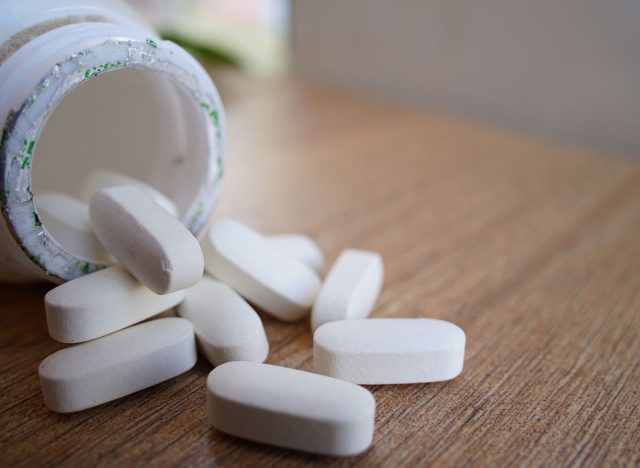The #1 Supplement To Help Prevent Osteoporosis Later in Life, New Study Finds

Taking care of your bones is an important part of keeping your body in great shape as you get older. When a person loses bone density or mass as they age, they may develop osteoporosis, according to the NIH Osteoporosis and Related Bone Diseases National Resource Center.
The Office of Disease Prevention and Health Promotion also notes that osteoporosis is a disease that affects around 10 million people in the United States who are 50 years old or older. Beyond that, over 43 million people are at risk of osteoporosis due to low bone mass. While that might be cause for concern, a report has found that taking calcium supplements when you’re younger may help to prevent osteoporosis when you are older.
Read on to learn more about the research findings, and for more healthy aging tips check out 4 Healthy Brain Foods Recommended by a Neurologist.

In the eLife study, researchers from Wenzhou Medical University in China took a look at 43 randomized controlled trials that involved a total of over 7,300 participants under 35 years old. The trials focused on the effect of calcium alone, or calcium plus vitamin D, on bone mineral density as well as bone mineral content compared to either a placebo or a lack of treatment. Of the 43 trials, 23 concentrated on participants who relied on their diet for calcium, while 20 trials involved calcium supplementation.
The findings showed that taking calcium supplements before the age of 35 could benefit both the bone mineral density in the femoral neck and bone mineral content in the lumbar spine. There was also an improvement in both the bone mineral density and bone mineral content of the overall body.
“[I]ntervention before young adults reach peak bone density might have a greater impact on bone health and prevent osteoporosis later,” said lead author Yupeng Liu, a researcher at the School of Public Health and Management, Wenzhou Medical University, China, according to EurekAlert!
“These study findings are exciting, as they shift our lens toward a preventative healthcare approach instead of a curative approach, where we only focus on health measures after experiencing disease and illness,” Megan Wong, RD, registered dietitian at AlgaeCal, who specializes in nutrition for osteoporosis and overall chronic disease management, tells Eat This, Not That!
This report’s findings also highlight the importance of starting to care for your bone health at an earlier age than many may suspect.
“Peak bone mass, which is when your bone density will be at its highest, is achieved around the ages of 25 to 30. It slowly goes downhill from there and, starting at the age of 40, we naturally lose around 1% of our bone density per year,” Wong says. “This is why it’s crucial to build up bone mass in your younger years. The more bone mass you start with, the less likely this natural bone loss will lead to osteoporosis and fractures.”
Wong also notes that “calcium itself isn’t enough to protect our bones.” Indeed, “in order for calcium to be properly absorbed and effectively do its job, it needs ‘helper’ nutrients.” Because of that, “when you’re shopping around for a calcium supplement, steer clear of ones that provide only calcium and look for added nutrients like vitamin D and magnesium.”









